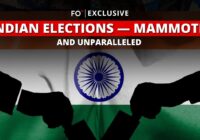India’s government has always been highly sensitive to the way its country is depicted in British media.
India’s Daughter, a documentary about the gang rape and murder of a young woman in Delhi, is a truly shocking piece of television. With its interviews with rapists, policemen and others, who calmly condone and defend rape in both principle and practice on camera, the film attracted such attention that the BBC brought forward transmission from its original slot on International Women’s Day.
But the Indian government has claimed the film was released without its approval, and it has been banned and removed from the schedules.
This act of censorship is nothing new. The Indian government has a long history of sensitivity to its portrayal on foreign television – and in particular, it has had a long and fraught relationship with the BBC.
Back in 1970, the distinguished filmmaker Louis Malle made a seven-part series, L’Inde Fantome. After its second episode was shown on the BBC, Indian authorities demanded the remainder of the series not be transmitted, as its focus on poverty and corruption portrayed the country in a bad light. The BBC refused to comply, and as a result, its Delhi bureau was shut down and correspondent Ronald Robson expelled from the country.
Interestingly, L’Inde Fantome had already been shown in France; it was the transmission by the BBC in the United Kingdom that really annoyed the Indian government. What was truly bizarre about the ban was that in those pre-VHS days, very few people in India would have actually been able to see the program. Even the high commissioner to the UK, who made vocal objections, later admitted he had not seen the film.
It was two years before the BBC was allowed back into India, and it only did so under complicated agreements about exactly what kinds of program-making would be permitted.
Many proposals were rejected, or dragged into negotiations so convoluted that their producers simply gave up.
In the early 1980s, prominent BBC filmmaker Tony Isaacs tried to get permission from the Indian authorities to film an episode for a series about the birth of nationhood in India. He spent thousands of pounds arranging location scouting and submitting permissions, but was ultimately rejected. He filmed instead in Argentina, complaining that it was “easier to film in a country with whom Britain was still at war than in friendly India.”
This resistance went right to the top. During the regime of Prime Minister Morarji Desai, any request for foreign documentary filming had to be personally approved by him. He publicly defended this sensitivity, referring to his rejection of a proposal that included untouchables —today called “scheduled castes” — as he thought it might convey a negative image of the country.
Indira Gandhi, too, had a very tense relationship with the BBC, and she was angry at what she saw as colonialist caricatures of a backward country — typically documentaries with images of starving beggars. When she died in 1984, a BBC local radio interview with a Sikh separatist was met with high-level complaints and violent demonstrations. The BBC correspondent Mark Tully fled over the wall behind his home in Delhi to get away from the protesters.
The rows between the BBC and the Indian government continued despite all the formal agreements put in place. The trickiest clause permitted the Indian government to view programs in advance. India insisted this entitled it to decisions about prior approval, but the BBC interpreted it only as a right to correct any factual inaccuracies.
It is this same argument about approval that is at the core of the ban on India’s Daughter.
The Indian government’s view of India’s Daughter is that prison authorities were promised early access to the interview with the rapists. But the film’s director, Leslee Udwin, claims she offered them the material, and that after wading through a few hours, they apparently complained that there was too much to watch and had her submit only highlights.
And it’s not just the BBC’s output that has riled India in recent years. When Bollywood princess Shilpa Shetty was insulted by Jade Goody and others on Channel 4’s Celebrity Big Brother in 2007, Indians reacted with fury. Effigies of Big Brother producers were burned on the streets of Patna, and Tony Blair and Gordon Brown were obliged to make diplomatic statements on the matter.
The way outsiders (particularly ex-colonizers) portray their society really matters to Indians, both those protesting on the streets and those in positions of power. The difference is that in the past, reacting to sensitive subjects with a ban was generally effective. Only a handful of people in Britain or India ever got to see taboo programs such as Louis Malle’s complete series or unflattering news items barred from broadcast.
Today, banning something is usually a way to guarantee maximum exposure, since invariably the offending material will find its way online. And doubtless in this case, everyone with any interest in India’s Daughter will find a way to watch the program. Many already have — and they are making up their own minds about India’s treatment of rape and its victims.
*[This article was originally published by The Conversation.] ![]()
We bring you perspectives from around the world. Help us to inform and educate. Your donation is tax-deductible. Join over 400 people to become a donor or you could choose to be a sponsor.
The views expressed in this article are the author’s own and do not necessarily reflect Fair Observer’s editorial policy.
Photo Credit: Jordi Bernabeu Farrús / Flickr
Support Fair Observer
We rely on your support for our independence, diversity and quality.
For more than 10 years, Fair Observer has been free, fair and independent. No billionaire owns us, no advertisers control us. We are a reader-supported nonprofit. Unlike many other publications, we keep our content free for readers regardless of where they live or whether they can afford to pay. We have no paywalls and no ads.
In the post-truth era of fake news, echo chambers and filter bubbles, we publish a plurality of perspectives from around the world. Anyone can publish with us, but everyone goes through a rigorous editorial process. So, you get fact-checked, well-reasoned content instead of noise.
We publish 2,500+ voices from 90+ countries. We also conduct education and training programs
on subjects ranging from digital media and journalism to writing and critical thinking. This
doesn’t come cheap. Servers, editors, trainers and web developers cost
money.
Please consider supporting us on a regular basis as a recurring donor or a
sustaining member.
Will you support FO’s journalism?
We rely on your support for our independence, diversity and quality.







Comment